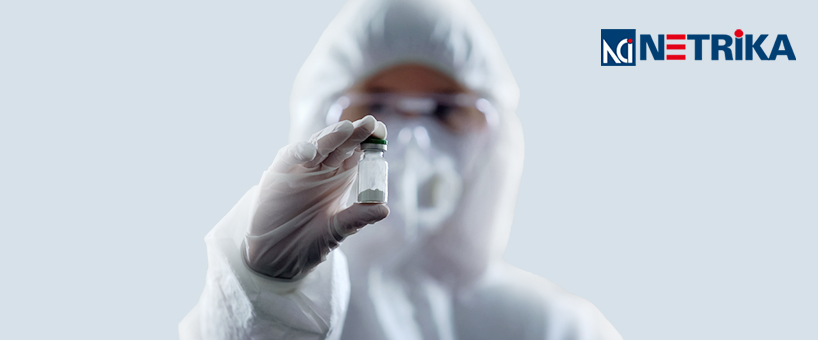Counterfeit Medicines: An Inhumane Practice!
- October 13, 2020
- Posted by: Netrika
- Category: Brand Protection

Pharmaceutical products are not exempt from the practice of counterfeiting. The number of counterfeit pharmaceutical products, since years, have been making their way into trusted pharmacies and having a deleterious effect on a wide section of population. The COVID-19 crises have further heightened the dangers posed by the global trade in counterfeit medicines. The seizure of more than 34,000 counterfeit and substandard masks, ‘corona spray’, ‘coronavirus packages’ or ‘coronavirus medicine’ by the European Anti-Fraud Office (OLAF) only represents the tip of the iceberg of this new increasing trend in counterfeiting. The supply of such medicines especially during a public health crisis such as the current COVID-19 pandemic makes addressing this global scourge more acute and urgent.
What are Counterfeit Medicines?
Counterfeit drugs/medicines are defined as products that are deliberately and fraudulently produced and/or mislabelled with respect to identify and/or source to make it appear to be a genuine product. They contain no active pharmaceutical ingredient (API), an incorrect amount of API, an inferior-quality API, a wrong API, contaminants, or repackaged expired products. Some medicines may even be incorrectly formulated and produced in substandard conditions.
Counterfeiting can apply to both branded medicines and their less expensive generic counterparts. These generics are produced after the original (brand name) product loses its patent protection and are available under a different name, offering an equivalent quality to brand name products. With the increasing magnitude of producing and selling counterfeit medicines, it has become quite a possibility that the manufacturers of generics are victims of counterfeiters.
Counterfeit Medicines: A Public Health Concern
The dangers caused by counterfeit medicines are two-fold. First, counterfeit medicines may contain an incorrect amount of active ingredient or no active ingredient at all. The public health risk for this type is quite significant as the treatment for which they are having a certain medication may go untreated. This can result in treatment failure, increased resistance to treatment, and even death. For example, in late 2012, 60 people died in two cities in Pakistan after drinking cough syrup. Syrups from two separate manufacturers were involved. It was found that both were using an active ingredient – dextromethorphan, a synthetic morphine-like compound – imported from a manufacturer in India.
The second type is when the counterfeits have little or no active pharmaceutical substance and consists of cheap and innocuous ingredients, such as chalk, flour, vitamins, sugar, which when taken with the expectation of having a pharmacological effect, can be fatal. Sometimes, many noxious ingredients have also been found in counterfeit medicines. Thus, such damaging effects may erode public confidence in healthcare systems, healthcare professionals, the suppliers, and sellers of even the genuine drugs, the pharmaceutical industry, and national drug regulatory authorities.
Counterfeit Medicines: A Global Problem
Such startling statistics clearly reveal the extent of this growing threat to public’s health and safety, including costs of treating patients who have suffered adverse health consequences because of consuming counterfeit medicines. Despite the efforts been taken by the brands along with private agencies to fight against these counterfeiters, they have not been able to achieve the desired results. The possible reasons can be the budget constraints and safety of their on-ground employees which has kept their scope limited. Also, law enforcement agencies which play a crucial role to control this practice and fight criminals are busy with activities revolving around COVID-19. These things are all working in favour of the counterfeiters and they continue to take advantage of this outbreak by rampantly and fearlessly manufacturing and selling counterfeit medicines. Subsequently, this cycle continues to have a negative impact on environment, the job market and innovation, raising additional costs, and depriving governments of tax revenues while eroding the businesses and reputation of legitimate producers.
Combating the Illegal Activity through Blockchain
A blockchain is a continuously growing list of digital records, or blocks, that are linked using cryptography. Organizations that use the records share data control in ledgers that are replicated and synchronized across all participants. This helps in eliminating all channels of counterfeit medical products, including pharmaceuticals, by transferring the hospital chain’s complete inventory to a blockchain-powered system. In addition, it also helps in documenting critical details like location and temperature from IoT devices attached to the packages, making the journey visible to all concerned entities, while greatly reducing the possibility of record tampering. The supply chain can therefore be made transparent, secure, decentralized, and verifiable with the help of blockchain, besides plugging loopholes in the supply of authentic medicines and trimming costs involved in detecting faulty areas.
Organizations & Associations
It is the need of the hour for every country and company to take responsibility to protect consumers and patients to uncover fraud and effectively prosecute counterfeiters. Cross-border actions such as establishment of national and international structures & networks and creation of suitable legal guidelines can become successful in solving this global problem. Furthermore, it is necessary to raise awareness and implement innovative anti-counterfeiting measures in the relevant institutions and authorities to ensure the safety of medicines used by customers.
